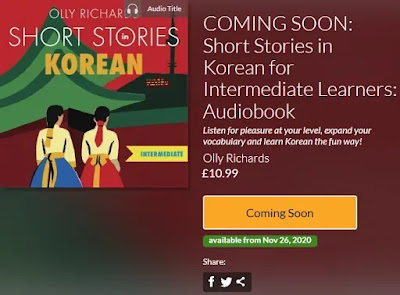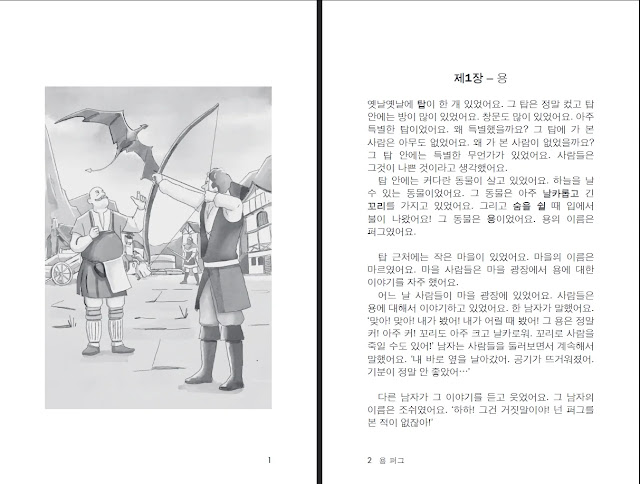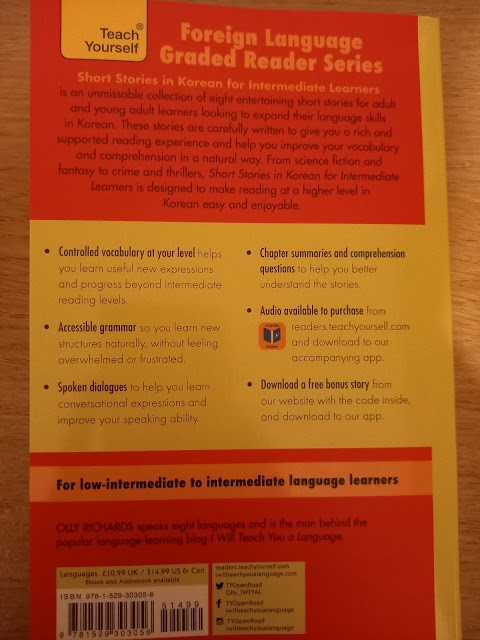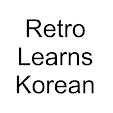For the last year or so, I've had my eye on Olly Richards since I found his YouTube channel and sequentially his short story books. I thought it was a very interesting concept, as it was effectively the same approach that I was taking to learning Korean. I'd like to give a big thanks to Olly and Sarah for providing me with the review copy.
As for Olly, you may know him from his YouTube channel or perhaps even his blog. He has spent a lot of time in the past giving advice to language learners and even running a podcast sharing his own experiences in learning multiple languages and answering listeners questions. He still regularly posts videos and posts blog posts so go check them out.
I have been successful with and highly recommend reading for every aspiring language learner as it is simply the quickest way to gain vocabulary. It may be no surprise to those learning Korean, that there is a severe lack of graded readers and simple content in, which to build up your language ability. Thankfully we now have a competitor but can it take the spot of a recommended resource?
 |
| Short Stories in Korean for Intermediate Learners front cover |
"Short" stories
I want to start this review by saying that for prospective buyers, do not be put off by the title. This book is very much for beginners. It has very simple and common words and short sentences. It avoids using a lot of rarer or more formal grammar so even those who are not too long into study can enjoy reading them and learning the very common and useful words.
I'm not going to elaborate on the forewords and the how to use the book but I am going to tell you to read it. I read the preview for the Italian short stories book a while ago and the tips that were explained really resonated with me. They iterate pretty much to the letter exactly how I feel you should go about reading in a foreign language.
 |
| Some of the advice on how to use this book |
All together there are 8 stories that are separated into a varying number of chapters, usually 3 or 4. We are presented with a picture that gives you a few clues as to what the story may be about. Chapters generally span about 2-3 pages long and are followed by a summary, some words that have been highlighted in advance and some comprehension questions.
I really love how much content there is in this book. The 8 stories with all extras still span around 207 pages and there is very little padding. There are no lengthy sentence by sentence translations, it is the perfect way to read. It must be said again that the level of the content is quite low and will be fantastic for people who are wanting to spend more time immersing but cannot find good low level reading content.
 |
| Picture and excerpt of first story |
The summaries are great for recapping the story as they are worded slightly different you may have misunderstood 1 word and these can help clear up exactly what happened. They are also completely in Korean so it's even more reading content for you to read.
The vocabulary is one of the weaker portions of the book if I am honest. Often there are words that you may already know as they are very basic while others you may not know are not highlighted. I am unsure if this is on purpose but it doesn't really affect the way you should read as it's just a guide.
Another thing is some highlighted words are repeated in other chapters and stories although they may appear as a different form. This is odd for me because you should know how to conjugate words on your own although some do appear as nouns in the dictionary for example 느낌 you should still be able to conjugate it back to 느끼다 so in my opinion it's a waste of space for it to be repeatedly highlighted.
 |
| Summary and highlighted vocabulary |
Comprehension questions are a fantastic way to see if you understood the story or not. They are great for reinforcing your memory and they use repetitive words both in the questions and the answers provided. Much like the summary these are great because they are all in Korean and provide you with more exposure to the language.
For those that are wondering. I have read through the stories a few times now and I could not find any words that I would say are odd or not worth learning. I did not personally find any new words or expressions as I am used to reading much harder content. I wish I had this when I was starting as I had to be a much higher level to start the content that I began with. However with this you can start reading much earlier.
 |
| Multiple choice comprehension questions |
The books biggest strength is the amount of content. There are 8 stories of different genres and they are all longer than you would expect them to be. Now you may see this as an advantage or a disadvantage but across the short stories range that the stories are mostly the same content with a few changes to names or activities. At first I thought maybe this is a disadvantage but if you are going to learn another language using these books it will be a huge advantage to have a rough idea of what is happening.
For the price difference I highly recommend the physical version. The size is really an advantage, it's not too bulky like a lot of other books mainly grammar books. There are 2 other bonuses I found with my copy, you get a code for 50% off the audio and also a code for a free bonus story available through teachyourself.com. At time of the review the audio is not yet recorded I will review this at a later date.
 |
| Short Stories in Korean for Intermediate Learners Audiobook |
Bonus Story: 용 퍼그(Dragon Ferg)
In the back sections of the book you will find a code to download a free story effectively making the total amount of stories up to 9 adding even more value to the book. This story is effectively the same as the previous ones but is only available in PDF form. The bonus story can be downloaded from here.
 |
| Excerpt from 용 퍼그(Dragon Ferg) |
Thoughts, improvements and tips
I am however still confused at the intermediate label as the content lines up with the beginner short stories of the other languages. I don't know whether they did this because they consider Korean harder but for me the only difference is it is much harder to guess words as there are virtually zero cognates with Korean. I'm skeptical that the book will get you to the B1-B2 range but it will definitely put you on your way to reading more difficult content.
I am looking forward to see the team continue working on content for many languages but I would love for them to continue with a follow up to this with even more beginner content to help people get used to reading in Korean and start to break through into real content for natives much more smoothly than I ever could. The huge volume of the stories gives you a great base to build on.
My recommendations for use would be to read through the stories and write down the words as you read until you finish a chapter. then look up those words using Naver or Krdict. Your main focus should just be to finish the content and get exposure to the language. It's ok and almost guaranteed you won't understand everything first time but you will pick up the uses of words through repetition. Good luck and enjoy your language learning journey.
 |
| Short Stories in Korean for Intermediate Learners back cover |
If you would like to purchase a copy, please follow this link to purchase from Amazon.
Once again thank you to Olly and Sarah and a reminder to check out the full range of Short Stories.
For related posts please check out these pages:
- How to Start Reading in a Foreign Language
- Nintendo Switch Games to play in Korean
- Talk To Me In Korean Book Review and Thoughts on the Curriculum
- The Monolingual Transition and How to Approach it
- Realistically How Long Does it Take to Learn a Language?
- How to Use Ridibooks(Korean Ebook Store)
- Olly Richards' Short Stories in Korean for Intermediate Learners Review
- Billy Go's Korean Reading Made Simple Review
- Lingo Mastery's Korean Short Stories for Beginners Review
- I read 61 Korean books in 2020
- 7 Reading Tips to Accelerate Your Korean Learning
- 7 Fantasy Webtoons You Should Read in 2021
- Tuttle's Korean Stories for Language Learners Review

No comments:
Post a Comment
Share your thoughts on this topic